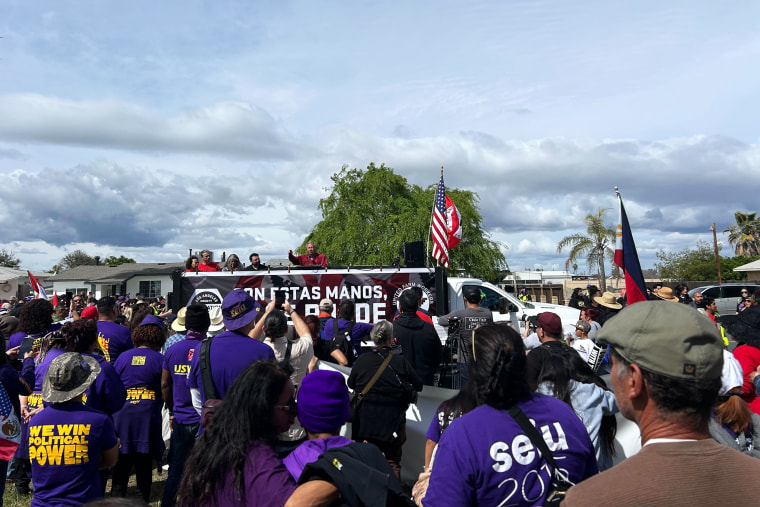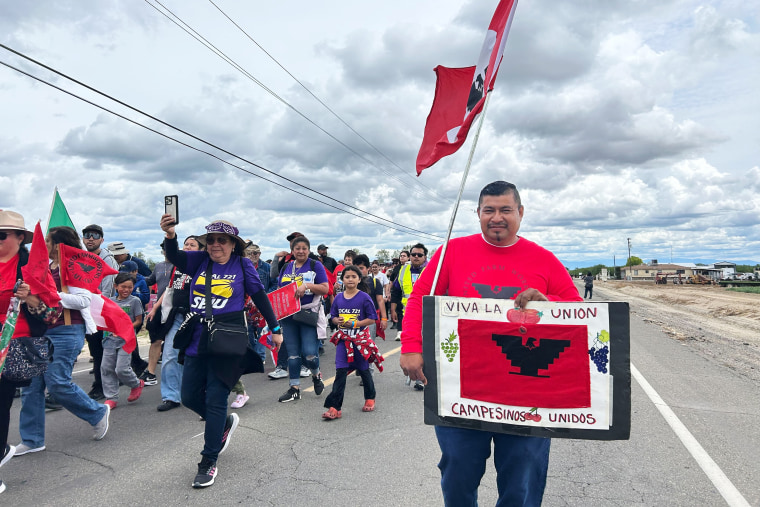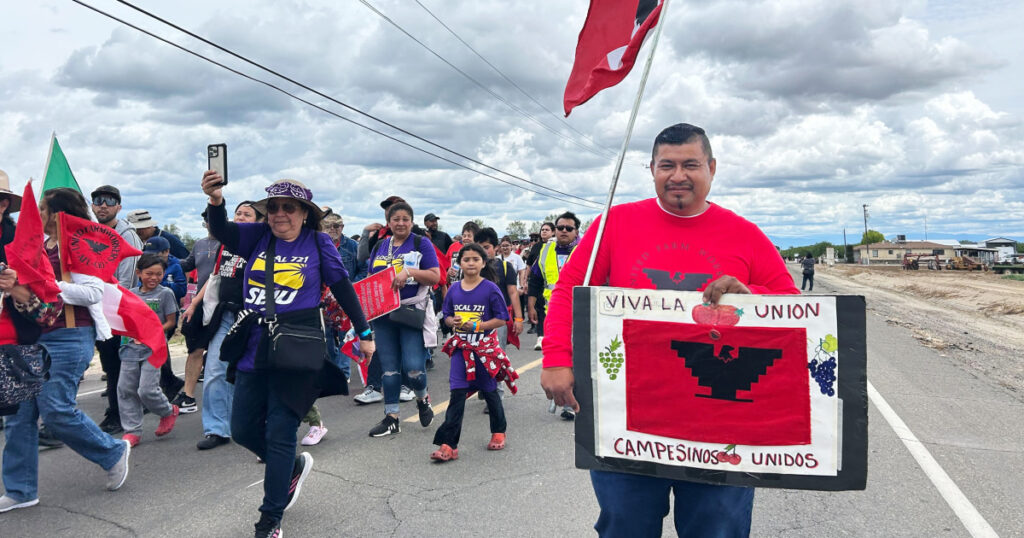DELANO, Calif. — Carolina Sanchez joined the United Farm Workers union in 2016 after the blueberry farm where she worked changed the daily rate for each pound she picked.
“They said if you don’t like what you’re paid, you can go home,” Sanchez said.
She organized the 500 workers at the Delano farm to strike with the UFW’s support. Eventually, they won a union contract, and Sanchez was elected as the union representative at her workplace.
This month, Sanchez began mobilizing her fellow workers to attend a march she was leading Monday, César Chávez Day.

Sixty years after the historic Delano grape strike, which launched Chávez’s 280-mile march to Sacramento with Filipino American and Mexican American farmworkers, over 5,000 United Farm Worker members and other union members gathered Monday in Delano for a march to the Forty Acres site where Chávez held his first public fast.
This year’s march focused on the Trump administration’s recent immigration policies, in the hope that the rally, called “con estas manos,” or “with these hands,” reminds people about the workers who grow and pick their food.
Farmworkers in California, who grow one-third of the country’s vegetables and three-fourths of its fruits and nuts, have reported growing fear and anxiety over a series of Immigration and Customs Enforcement arrests and deportations in the Central Valley. Around half of California’s farmworkers are undocumented, according to a study by the University of California, Irvine, and according to the U.S. Agriculture Department, about 42% nationwide lack legal immigration status.
UFW Secretary Treasurer Armando Elenes said those numbers tend to be underreported. “We estimate it’s closer to 60 or 70 percent undocumented farmworkers” in California, he said.
Elenes said ICE has detained and deported around 200 farmworkers in Kern County. He said that calling for more temporary work visas isn’t enough and that there’s a need for broader labor protections for workers who fear being rounded up and separated from their families.
“We need to push back on the federal government. We need state and local laws that give our workers sick days, heat protection and health care,” he said.

At the march, representatives from other labor organizations, like the California Federation of Labor Unions and SEIU California, addressed the crowd, and California Attorney General Rob Bonta shared his family’s story.
“Being here is like coming home for me — I grew up with my parents working for United Farm Workers, and I know the fight is not about the grapes or the lettuce, but it’s about the people,” said Bonta, who was born in the Philippines and whose mother helped organize Filipino and Mexican farmworkers.
The march allowed farmworkers like Gabriel Leal, who picks grapes and cherries, to feel supported by the turnout. ICE rounded up a few of his friends during the January raids.
“They were stationed along the roads, stopping anyone,” he said. “Even if we’re afraid, we have to go into work — without us, who’s going to feed our families? Who’s going to feed our country?”
But not everyone in the region is unhappy about the Trump administration’s immigration policies and deportation measures.
Alex Dominguez, a Kern County resident who identifies as a Republican and comes from generations of field workers, said he and his family members are cautiously optimistic about the ICE arrests.
“A part of me understands the worries and concerns from the larger community around increased police presence,” said Dominguez, a water and agriculture attorney. “But from what I’ve seen, it’s the bad guys that are being taken, and that makes our Latino families safer.”
Dominguez, who is also the vice president of the Kern County Farm Bureau, said he’s listening to growers, ranchers and farmworkers but doesn’t believe the immigration measures have stopped any of them from being able to do their jobs.
“These workers have to make money, so not going to work is not an option,” Dominguez said.
During the march, César Chávez’s son Paul Chavez said the point of the mobilization isn’t to change people’s minds. “We’re gathering people who want to stand up to racism and xenophobia to show that there are people who are on their side,” he said.
Sanchez was hopeful that the march sends a message that immigrant workers everywhere are supported.
“All of us workers understand what Chávez accomplished and will never forget his legacy,” she said.


